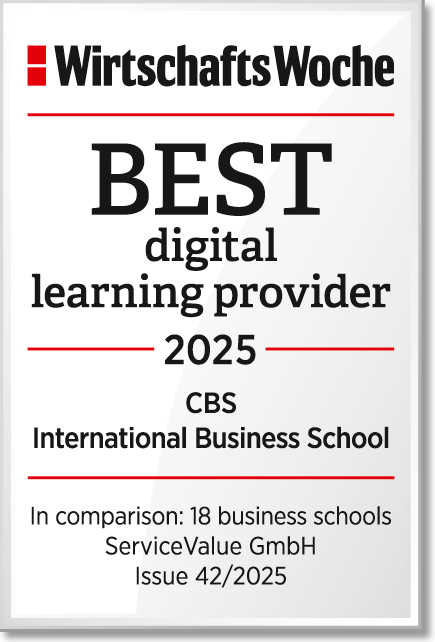Strategy & Consulting (M.Sc.)
Develop Innovative Solutions for Complex Challenges with a Business Consulting Master’s in Germany!

Develop Global Business Strategies and Lead Organisations with Your Master's Degree in Strategic Business Consulting
Successful companies need clear strategies and people who can create them. In the Master’s in Business Consulting, you’ll learn to analyse complex challenges, design effective solutions, and drive the targeted development of organisations.
The programme takes you through the entire consulting process – from analysis and strategy development to presenting your results to management. You will learn to structure complex problems, work with data-driven approaches, and develop convincing solutions – just like in leading consulting firms. In real company projects, you will sharpen your analytical and strategic skills as well as your professional presence – the ideal preparation for a successful start in the consulting industry. Throughout the programme, you will be guided by professors with international consulting experience who support you with modern methods and interdisciplinary case studies.
By pursuing a master's in Business Consulting in Germany – Europe’s largest economy and home to some of the world’s leading consultancies – you’ll gain access to a dynamic job market and an international professional network. Cologne, with its mix of business innovation and global culture, provides the perfect base for launching your consulting career in Europe and beyond.
This study programme is part of our NEW ERA - Master programmes.
*Tuition fees differ for EU and non-EU students. For the specific fees please check the tuition fees information page. Status: April 2025.

What Sets Strategy and business consulting at CBS Apart

Real Projects. Real Impact
Solve real challenges from companies like E&Y, UPS, and KPMG and present your solutions directly to decision makers.
Learn from Leading Experts
Learn from former C-level leaders, managers, and consultants who bring real-world leadership and consulting experience into the classroom.
NEW ERA Education for Future Leaders
The NEW ERA master concept links academic depth with hands-on application. You strengthen analytical thinking, decision making, and the ability to apply knowledge using AI tools and real business formats.
Study Globally. Work Globally
Study in an international community with students from 75+ nations and build the intercultural skills needed for leadership roles in global organizations.
Curriculum
Economic Analysis & Global Markets
6
ECTS
- Apply tools of economic analysis to understand market dynamics
- Gain critical insights into international trade, foreign exchange, and interests
- Analyse economic forces in trade policies and global markets
- Understand international capital flows and financial institutions
Strategy Development
6
ECTS
- Apply strategy-making processes and strengthen strategic reasoning
- Turn analysis into sustainable strategy
- Play the strategic chess of business with foresight
- Master decision-making from firm to network level
AI Based Data Research
6
ECTS
- Use AI to automate data collection and analysis
- Generate insights faster — with reproducible, transparent AI research pipelines
- Turn unstructured information into decision-relevant intelligence — at industry speed
- Apply data analytics and scientific methods to real data
Financial Investment Analysis
6
ECTS
- Analyse business models and annual reports of international companies
- Use relevant key ratios to evaluate companies
- Speak the language of management consultants, investors and private equity firms
- Use your knowledge to develop investment decisions and strategies
Consulting Approaches & Tools
6
ECTS
- Craft written consulting project proposals and define clear project scope
- Apply strategic analysis tools to uncover real-world business challenges
- Solve problems using consulting frameworks
- Communicate and present like a professional consultant
Empirical Research & Visualisation
6
ECTS
- Design attractive visual narratives that effectively communicate research findings to stakeholders
- Apply visualisation best practices to present empirical evidence in formats that engage audiences
- Master research design principles and methodologies to investigate business questions
- Analyse quantitative and qualitative data using statistical tools to derive meaningful insights
Integrative Case Studies
6
ECTS
- Synthesise cross-disciplinary insights to solve complex business problems
- Evaluate strategic choices under changing market conditions
- Use data-driven analysis to support managerial decision-making
- Assess strategic outcomes across diverse international case studies
Product Development & Innovation
6
ECTS
- Transform customer insights into innovative products that address real market needs
- Lead through the development lifecycle from ideation to market launch
- Apply innovative concepts and solve complex problems to create user-centered solutions
- Evaluate market opportunities and validate product-market fit
Business Model Analysis & Industry Comparisons
6
ECTS
- Adopt a holistic view of corporate business models
- Integrate knowledge from your studies into real business and industry analysis
- Develop practical, cross-disciplinary solutions to complex cases
- Solve complex business model challenges
Managing Change with Projects
3
ECTS
- Become a project manager who contributes to value-based business development
- Set up projects to solve real problems and use project reviews
- Apply the techniques and methods that make projects successful
- Achieve change with change management methods
Leadership & Executive Development
3
ECTS
- Learn core leadership concepts and latest research insights
- Combine scientific principles with practical tools for effective leadership skills
- Strengthen your personal leadership profile through communication skills and confident decision-making
- Develop an understanding of leadership skills for modern organisations
Event Lab
3
ECTS
- Develop an event (TedX/leadership/team building/company/else)
- Design and carry out the event marketing to potential participants
- Organise the event and carry it out in concrete terms
- Perform the event review & retrospective
Project: Consulting a Company
9
ECTS
- Receive a consulting challenge from a real client company
- Define and scope a real consulting project in a team
- Develop evidence-based solutions and actionable recommendations
- Present your recommendations to the client company
Managing Operations, Processes & Technology
6
ECTS
- Design efficient operational systems that optimise resources and deliver consistent quality
- Implement process improvement methodologies to increase organisational performance
- Build operational strategies that align with business goals and create sustainable competitive advantages
Sustainability & Corporate Responsibility
6
ECTS
- Discuss corporate responsibility for social and environmental developments
- Apply stakeholder and double materiality analyses for sustainable strategy development
- Integrate ESG criteria into leadership and decision-making processes
- Strengthen resilience, leadership, and communication through sustainability
Strategic Human Resource Management
3
ECTS
- Develop a strategic alignment of HRM practices
- Consider current HRM trends and best practices
- Get familiar with strategic HRM analysis
- Apply modern methods of HRM
Facilitation, Communication & Negotiation
3
ECTS
- Analyse negotiation scenarios systematically and design effective strategies
- Understand communicative and economic factors that influence negotiations
- Learn how to strategically prepare, conduct and evaluate negotiations
- Develop persuasiveness, tactical thinking and decision-making skills in complex settings
Entrepreneurship & Venture Lab
6
ECTS
- Develop and test innovative business ideas
- Implement the Lean Startup methodology
- Cultivate entrepreneurial thinking
- Develop and define scalable business ideas
Management Simulation Game
6
ECTS
- Lead a virtual company in a simulation
- Make complex managerial decisions
- Assess the impact of business decisions
- Anticipate competitor reactions
Master Thesis
18
ECTS
- Demonstrate mastery of your field by conducting independent research that addresses a relevant business topic
- Apply strategic frameworks and methodologies to analyse complex problems and develop evidence-based solutions
- Synthesise knowledge from multiple disciplines to generate insights and recommendations
- Communicate findings professionally through rigorous academic writing
One Master. Three Tracks
Your career goals are unique, and your study path should be too. That’s why we offer you full flexibility: simply choose the 120, 90, or 60 ECTS track that best matches your academic background, your schedule, and your ambitions. Whether you want to fast-track your entry into the job market or dive deep into specialization, at CBS you can design the Master’s degree that fits your life.
120 ECTS
90 ECTS
Career Opportunities with a Master’s in Strategy and Business Consulting
Consulting expertise is in high demand across industries. Graduates can work in IT, logistics, banking, technology, telecommunications, as well as in the chemical and pharmaceutical sectors. Even if you do not wish to specialise in one industry during your studies, a Master of Science in Business Consulting offers you endless career opportunities in consulting and strategy roles—both nationally and internationally.
Below, you’ll find top career opportunities with your Master’s in Strategic Management and Consulting.
Why CBS UNIVERSITY
Your path to CBS
Starting your studies at CBS University of Applied Sciences is as unique as you are – and at the same time, completely hassle-free. With our user-friendly online application process, you can apply from anywhere, with no numerus clausus restrictions. Instead of rigid admission requirements, we focus on a personal selection process that highlights your strengths and potential.
Whether you choose a dual, part-time, or full-time programme, CBS University offers the perfect combination of theory and practice.

Admission requirements
The Zugangsvoraussetzungen für dein Master-Studium an der CBS University of Applied Sciences variieren je nach Studiengang . into your studies at CBSSciences is so Like yourself — and at the same time designed. With our easy to use Can you yourself apply, completely without . Instead of staring Waiting for you with us is a that is your strengthsand focuses on potential. Regardless of whether you opt for dual, part-time or full-time study, the CBSUniversity offers you the of
Deadlines
The application deadline is year round open, even before you graduate from high school. For dual study programs, you should sufficient lead time Plan so that we can find your suitable practice partner. The start of studies is flexible: in the winter semester or, for selected programs, also in the summer semester. One early candidature is particularly important for limited study places secure and apply for any necessary visas in good time.
funding
A dual or part-time study Is often used by the Practice partner financed, which is also a valuable occupational provides accompaniment. A full-time study On the other hand, can be achieved by numerous Funding opportunities like BAföG or stipends Personalize to give you an optimal connection of personal Development and academic To make the future possible.
HANDS-ON LEARNING AT ITS BEST
At CBS, it’s not just what you study that matters, it’s how you study. Our programmes offer a completely new learning experience: hands-on, interactive, and firmly rooted in real-world practice. You’ll notice your skill set growing day by day through real projects, modern tools, and intensive practical experience. Our lecturers bring years of industry expertise to the classroom, and regular guest speakers give you exclusive insights into professional life. Artificial intelligence, teamwork, presentations, networking, and real business cases are all part of your everyday studies. It’s not just about preparing for the future – it’s about shaping it yourself.
Business Projects
Im Rahmen der Business Projects an der CBS International Business School haben Studierende die Möglichkeit, gemeinsam mit renommierten Unternehmen an realitätsnahen Projekten zu arbeiten. Diese praxisorientierte Lehrform verbindet theoretisches Wissen mit konkreten wirtschaftlichen Fragestellungen und gewährt tiefe Einblicke in berufliche Abläufe.
Unternehmenskooperation
Dank eines Netzwerks von über 1.300 etablierten Unternehmen aus diversen Branchen profitieren Studierende von exklusiven Einblicken in die Arbeitswelt. Diese Kooperationen eröffnen nicht nur spannende Perspektiven, sondern fördern auch die Entwicklung wichtiger Kontakte und bieten nachhaltige Karrieremöglichkeiten.
Praktikum/Berufserfahrung
Ob in Form von Pflichtpraktika, die fester Bestandteil vieler Studiengänge sind, oder durch die Integration von Berufserfahrung in duale und berufsbegleitende Programme: Du kannst dein Fachwissen direkt in der realen Arbeitswelt anwenden.
HOW DO I FIND MY PERFECT CAREER PATH?
The Career Service and Talent Development team at CBS support you in finding your ideal partner company. With 1:1 coaching, workshops, and a wide network of corporate partners, we guide you throughout your entire time at university. Together, we’ll develop a strategy that matches your strengths and career goals.

Ablauf deS Masterstudiums


Inspiration and Impact – What Our Alumni Say
Let yourself be inspired by the experiences of our alumni and discover how the Master’s degree at CBS has shaped their professional and personal development.
FAQ: The most important questions about studying Strategy and Business Consulting
Here you can find answers to all important questions all around your Business Consulting master's degree in Germany. If you have any further questions, feel free to contact us at any time.
What is Strategy and Business Consulting?
The Master’s in Strategy and Business Consulting prepares students for challenges in corporate strategy and management consulting. You will develop analytical and conceptual skills to create and implement successful business strategies.
Why should you get a Business Consulting master's in Germany?
The business consulting master's in Germany provides in-depth expertise in strategy development, change management, and consulting techniques. It is ideal for aspiring leaders and consultants who want to work in a dynamic, global business environment.
How long does the Strategy and Business Consulting Master’s programme last?
The Master’s in Strategic Management and Consulting typically lasts 4 semesters (2 years) and concludes with the award of a Master of Arts (M.A.).
Does the Strategy and Consulting Master’s programme have a Numerus Clausus (NC)?
There is generally no NC for the Strategy and Business Consulting Master’s in Germany. Admission is based on your academic background and relevant professional experience.
What are the admission requirements for Business Consulting Master’s programme?
Applicants need a recognised Bachelor’s degree in business, IT, or a related field. Since the Strategy and Business Consulting Master’s programme is taught entirely in English, strong English skills are required.
How is the Business Consulting Master’s programme structured?
The programme includes practical projects, strategic case studies, corporate partnerships, and consulting simulations to provide hands-on experience.
Where can I study Business Consulting master's in Germany?
The Business Consulting Master’s programme is offered at the Cologne campus in Germany.
What will I learn in the Strategy and Business Consulting Master’s programme? What are the core subjects?
Key study areas include Corporate Strategy, Digital Transformation, Sustainable Business Management, Business Development and Innovative Business Models.
How much can you earn after completing your studies?
Graduates can expect starting salaries between €50,000 and €80,000 per year, depending on industry and experience.
Can I write my Master’s thesis in collaboration with a company during the Strategy and Business Consulting studies?
Yes! In the final semester, you can either spend a semester abroad or complete a corporate internship, providing the perfect opportunity to write your Master’s thesis with a business focus.
Any questions? We're here to help
Do you have any questions about our bachelor's or master's degree programs? Our Student Advisory team is here to support you! Schedule your personal consultation—online or in person—for tailored, non-binding guidance on finding the right study program for you.

























